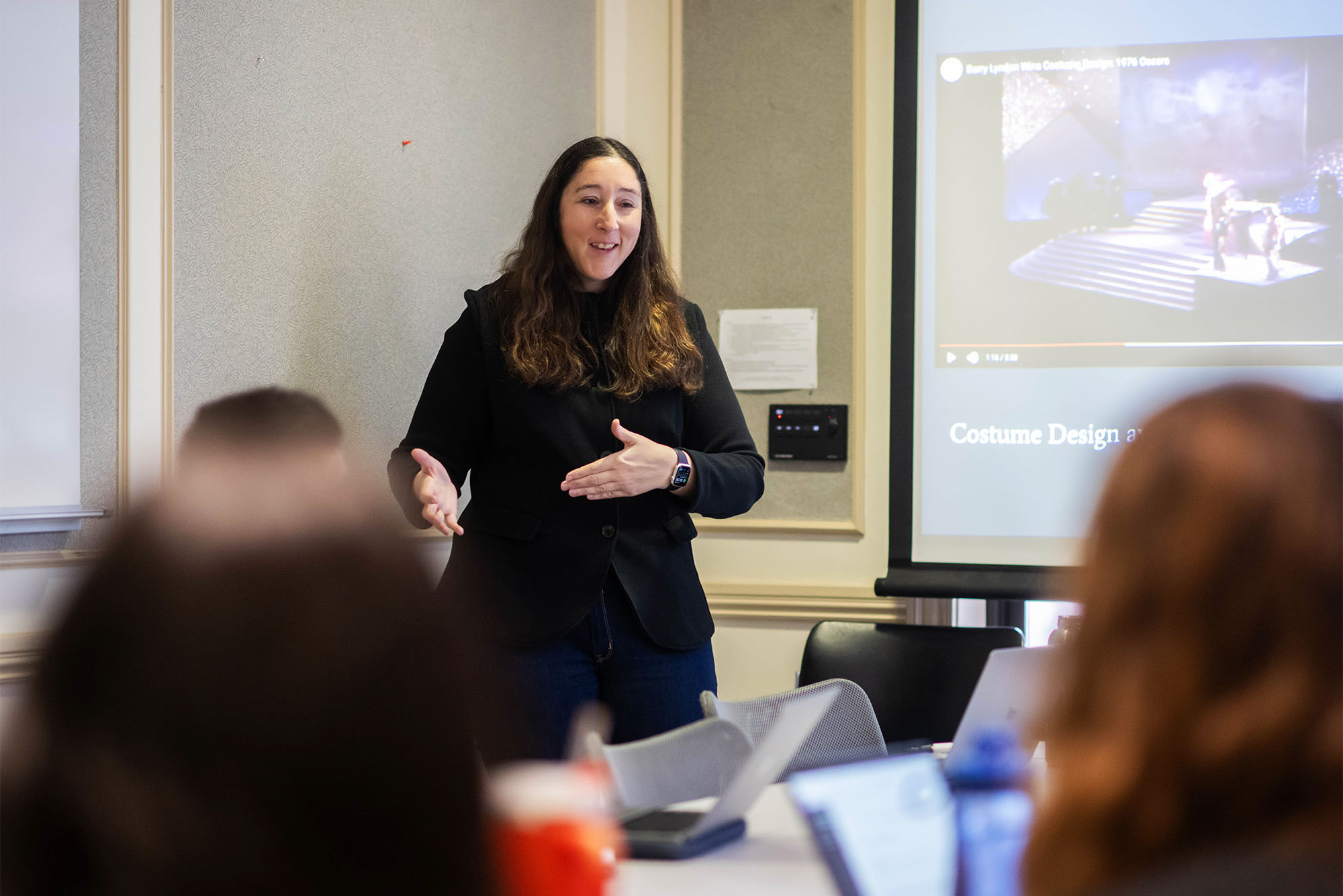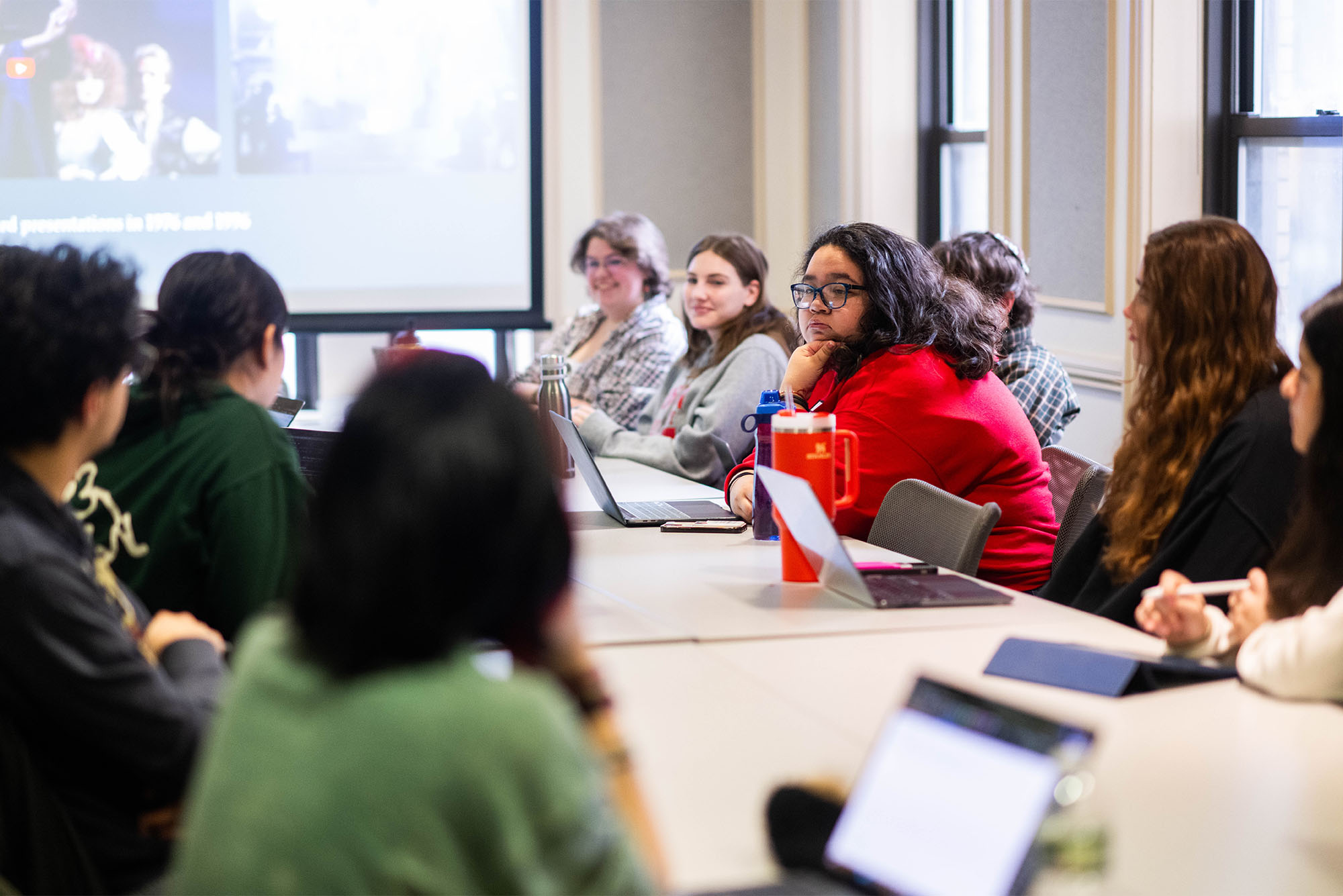New BU Course: A Deep Dive into the History of the Academy Awards

Course instructor Betsy Walters (COM’20, GRS’25), an AMNESP PhD student, is writing her dissertation on the Academy Awards.
New BU Course: A Deep Dive into the History of the Academy Awards
American & New England Studies class looks at how film’s most iconic awards have become a cultural ritual and a platform for social change
The Academy of Motion Picture Arts and Sciences is banking on viewers tuning in Sunday for the 96th Academy Awards ceremony, Hollywood’s biggest night of the year. This year, the Academy’s hope is that the ceremony gets a ratings boost from two of last year’s biggest hits, Barbie and Oppenheimer, nominated for 7 (Barbie) and 10 (Oppenheimer) Oscars. One of the highlights of the evening is expected to be Barbie star and best supporting actor nominee Ryan Gosling performing his Oscar-nominated tongue-in-cheek power ballad “I’m Just Ken” live from the Dolby Theatre.
Gosling’s performance “has the potential to be a huge spectacle,” Betsy Walters (COM’20, GRS’25) said as she kicked off her lecture to the movie buffs enrolled in her new Arts & Sciences American & New England Studies (AMNESP) course, Perspectives on the American Experience: The Oscars and American Culture.
The class—which quickly filled its 15 spots—examines how the awards ceremony, and the Academy, operate, the types of films and genres usually favored by Academy voters, and how the annual Oscars show has become a cultural ritual and a platform for social change.
Every year, AMNESP invites its PhD students to pitch a class topic based on their interests and research. Walters earned an MFA from BU’s College of Communication in 2020 with a thesis focused on Netflix’s controversial presence at premier festivals like Sundance and Cannes. Now working on a doctorate, she is continuing her research on the film and television industry (specifically, streaming platforms) and is writing her dissertation on the Academy Awards. She thought a course looking at the contemporary Oscar ceremonies through the lens of many recent changes in Hollywood would dovetail nicely with her research and interests.
In addition to globalization, streaming platforms, and superhero franchises, the class delves into controversies such as #OscarsSoWhite, the social media campaign to diversify Academy membership, and the ongoing conversation surrounding female directors (Greta Gerwig’s Barbie snub is a hot topic this year) and gender equity. For their discussion on American government and politics, the class read a journal article on the real-life hostage thriller Argo (Best Picture winner in 2013) and Zero Dark Thirty, about the hunt for Osama bin Laden. When it was time to study satires and allegories of American imperialism, Walters assigned an article titled “Avatar Films Have Always Been a Gross Reimagining of Colonialism.”
Walters says some people dismiss the Oscars as frivolous, but she believes the awards show has historically played—and continues to play—a critical role in American culture. “They really perpetuate these narratives, histories, and ideals that I don’t think are always fully obvious to us at the time,” she says. “But when you look at the patterns, you can see how powerful they are.”
One example she cites is the year legendary actors Elizabeth Taylor and Paul Newman wore red ribbons on their chests in support of AIDS activism when they presented the Academy Award for Best Picture. Years later, one journalist described that moment in 1992 as “quietly groundbreaking.”

In a recent Wednesday morning class, Walters reminded students of their previous conversation about how live TV can create a sense of unity. Who are the Oscars trying to unify, she asked the class, and what is the show’s message?
Aurelina Brown (COM’26) raised her hand. “The reason they were created was to legitimize movies,” she said. “Movies are a legitimate part of our culture, so let’s come together and celebrate.” Walters nodded in agreement, saying, “Remember, the Academy was created by Hollywood for Hollywood, so [the Oscars ceremony] is kind of ‘Isn’t Hollywood grand?’… It’s kind of the motto of the Oscars.”
Walters next played an old and grainy clip of the 36th Academy Awards, held in 1965 (Rock Hudson! Julie Andrews!), before screening one of the most bizarre Oscar moments of all time: in 1989, actor Rob Lowe and an actress dressed as Snow White sang a horrendous rendition of “Proud Mary” as the audience of Hollywood elite looked on, horrified. Critics quickly labeled it one of the low points in Academy Awards history.
“The joy of experiencing this together? We’re trauma-bonded,” Walters said, laughing, when the skit ended. “Who thought this was a good idea?” one of the students quipped.
In recent years the Oscars’ stature has shifted somewhat. Two decades ago, before the advent of streaming services, everyone more or less watched the same TV shows and saw the same films—and that was the height of the Oscars’ prominence, Walters says. Since today’s streaming platforms give more people access to more films, viewership is divided. Many movie fans saw Barbie and Oppenheimer this summer, but far fewer saw Anatomy of a Fall or Maestro, two other films nominated for Best Picture.

Walters still believes the Oscars are relevant and that people are engaging with them, albeit in different ways, like viewing clips on X or TikTok. “After ‘the Slap,’ I had never seen Gen Z want to talk about the Oscars as much as they did,” she says, referring to the 2022 Oscar telecast when best actor nominee (and eventual winner) Will Smith infamously slapped presenter Chris Rock after Rock made a joke about Smith’s wife. “They’re aware of it, they’re just engaging with it in different ways,” Walters notes.
On Sunday night, the class will watch the Oscars together and chat on their group Slack channel about the show as it happens, calling on previous discussions and themes they’ve talked about in class so far.
Grey Retz (CAS’26) admittedly signed up for the course because it’s required for his American studies major, but says he’s since grown to love it. He likes how the small size of the class lends itself to lively discussion. A history buff, Retz also appreciates how the class has opened his eyes to how the Oscars reflect the current values and issues that matter to society.
For example, the class discussed how the aftermath of Watergate and Vietnam produced the famous films All the President’s Men, Rocky, and Taxi Driver. “I find it so fascinating how we can look at something commercial, like Hollywood and its movies, and see how viscerally they are reacting to the culture of the time,” Retz says.
He says many people perceive Hollywood as out of touch with society and current events. He disagrees. “The media is always going to be reflective of the culture that it’s coming out of,” he says. “And just being able to visualize that more and have a better language to talk about that has been really, really fun.”


Comments & Discussion
Boston University moderates comments to facilitate an informed, substantive, civil conversation. Abusive, profane, self-promotional, misleading, incoherent or off-topic comments will be rejected. Moderators are staffed during regular business hours (EST) and can only accept comments written in English. Statistics or facts must include a citation or a link to the citation.